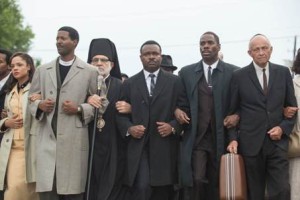 As timely as it is, Selma, the new film by Ava DuVernay, also represents a refreshing approach to historical drama. In depicting a crucial period in American history, it resists the softening that too often mars our view of the past, choosing instead to favor the pain and complexity that we tend to ignore.
As timely as it is, Selma, the new film by Ava DuVernay, also represents a refreshing approach to historical drama. In depicting a crucial period in American history, it resists the softening that too often mars our view of the past, choosing instead to favor the pain and complexity that we tend to ignore.
Selma tells the story of the campaign and march for voting rights in Selma, Alabama, in 1965, and especially of its leadership by Dr. Martin Luther King, played here by David Oyelowo. After a prelude showing King and his wife Coretta in Oslo where he received the Nobel Peace Prize that year, we see four girls chattering as they walk downstairs in a church. A sudden explosion sends a shock wave through the audience. This is the bombing of a church in Birmingham, Alabama, that killed four little black girls, a vicious act of terror and violence that sets the tone for the film.
Over the years, and particularly since the designation of Dr. King’s birthday as a national holiday, a kind of golden hue has settled over him and the civil rights era in mass popular culture and political discourse. With the frequent evocation of his “I have a dream” speech, and the emphasis on non-violence, those who don’t study history too closely might think that the movement was a gentle, consistently positive event that met with wide agreement and affirmation from the country as a whole. Selma confronts us with the truth of the matter: civil rights activists were constantly subjected to violence and the threats of violence, both from official government forces and covertly supported racist ones. Murderers were rarely pursued or prosecuted, and the few times they were, all-white juries voted to acquit them. Several actual historical killings are depicted in this film, and crucially, in the story’s narrative centerpiece, the attempts by protestors to march across the Edmund Pettus Bridge, we witness the unleashing of police violence against the peaceful marchers, with tear gas and billy clubs, brutally beating men and women, forcing them to retreat to safety. Furthermore, the decision to come to Selma, where attempts by blacks to vote were met with impossibly difficult literacy tests and other barriers, is shown to be calculated with the knowledge that the town’s police chief might respond in just such a way. Thus King and his advisers hoped to influence President Johnson to step in and enforce constitutionally protected voting rights. Nonviolence was not passive; it was a deliberate method of protest and resistance.
For someone like myself who lived during these events, it can be hard to see the real faces and voices we remember so well replaced with those of actors. However, Oyelowo does a great job evoking the deep and sonorous tones of Dr. King’s voice, both in his speeches and private conversations. Carmen Ejogo is excellent as Coretta King, and there’s fine work from Colman Domingo as King’s best friend and confidant Ralph Abernathy, along with a host of other good actors. I had more difficulty accepting the two British actors, Tom Wilkinson and Tim Roth, who play Lyndon Johnson and George Wallace—Wilkinson in particular has a voice that is not deep enough, and he can’t really do the Texas accent, but these are minor complaints.
DuVernay uses an interesting technique in the film of marking the scenes with typed FBI surveillance reports that appear on the screen. We are reminded, as we must be, that J. Edgar Hoover considered King to be a Communist and degenerate, had his phones tapped, and actually had threatening and abusive letters sent to him. The establishment was not happy with Martin Luther King, and the film thankfully makes that fact quite clear.
Bradford Young’s cinematography is beautiful, very deep and rich. Sometimes the film tries a little too hard, but Selma really is an important film and a good one. The parallels with what is going on today, in Ferguson and elsewhere, where a new generation is rising in protest against white supremacy, are clearly and bravely made.

